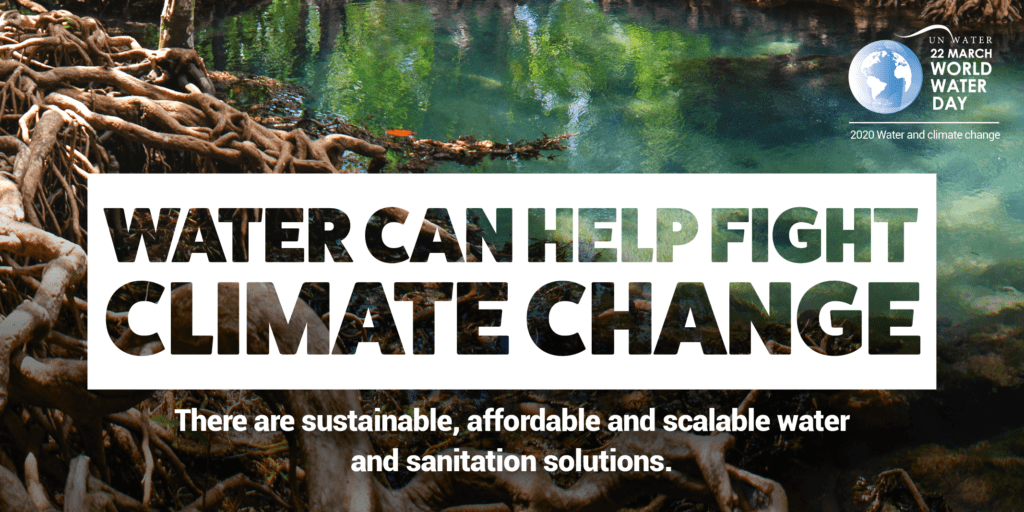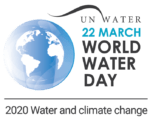Water can help fight climate change: 2020 World Water Day

World Water Day 2020, on 22 March, is about water and climate change – and how the two are inextricably linked. Did you know that water can help fight climate change? Our wetlands can soak up carbon dioxide from the air, our vegetation protects against flooding and erosion, our rainwater can be stored for dry periods, and our wastewater can be reused!
World Water Day, an annual observance by the United Nations, celebrates water and raises awareness of the 2.2 billion people living without access to safe water. The 2020 theme, Water and Climate Change, promotes the messages that:
- We cannot afford to wait. Climate policy makers must put water at the heart of action plans.
- Water can help fight climate change. There are sustainable, affordable and scalable water and sanitation solutions.
- Everyone has a role to play. In our daily lives, there are surprisingly easy steps we can all take to address climate change.
Fighting climate change can open up vast opportunities for the economy in many areas. We should embrace circular production systems and use water much more responsibly. As the global population grows, so does the demand for water, which depletes natural resources and damages the environment in many places.
Solutions include protecting carbon sinks such as oceans and wetlands, adopting climate-smart agricultural techniques, and increasing the safe reuse of wastewater. Water is our most precious resource – we must use it more responsibly. We must balance all of society’s water needs while ensuring the poorest people don’t get left behind.
There is some good data available on the impacts climate change is having on our water resources. For the last 47 years, the IISD Experimental Lakes Area (IISD-ELA) in Northwestern Ontario has been collecting detailed data on climate, stream and lake ecosystems, making their long-term dataset extremely valuable to understanding how climate change has, and will, influence our precious freshwater resources.
The researchers at IISD-ELA have found out some very interesting, but alarming, facts: our air is getting warmer, our lakes are getting darker and less icy, and fish have become smaller. What about in Muskoka?
Muskoka Watershed Council, using long-term data from the District of Muskoka’s Lake System Health Monitoring Program and from scientists at the Dorset Environmental Science Centre, reported in the 2018 Muskoka Watershed Report Card that lakes in Muskoka experience, on average, 19 days less of ice cover than they did in 1975, and that summer surface water temperatures have increased 0.5 °C on average. Will we also see lakes getting darker and fish getting smaller here in Muskoka, similar to what has been reported for the IISD-ELA lakes?
 This World Water Day, take a moment to learn about some of the impacts climate change is having on our water resources and how water can help us fight climate change. Learn about the IISD-ELA findings at https://www.iisd.org/sites/default/files/publications/iisd-ela-climate-change-brochure.pdf, check out the climate change indicator in the 2018 Muskoka Watershed Report Card at https://www.muskokawatershed.org/reportcard-story-map/, and visit the World Water Day website at www.worldwaterday.org.
This World Water Day, take a moment to learn about some of the impacts climate change is having on our water resources and how water can help us fight climate change. Learn about the IISD-ELA findings at https://www.iisd.org/sites/default/files/publications/iisd-ela-climate-change-brochure.pdf, check out the climate change indicator in the 2018 Muskoka Watershed Report Card at https://www.muskokawatershed.org/reportcard-story-map/, and visit the World Water Day website at www.worldwaterday.org.
